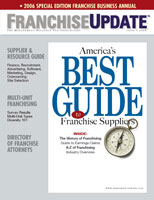What You Fear Most May Present Your Biggest Opportunity: Using Earnings Claims Advantageously
How much can I make?
Let's face it. From a franchisee's perspective, the single most important piece of information to gather during the sales process is the likely return on investment. Any franchise salesperson will tell you that the most frequently asked questions by prospective franchisees during the sales process are: "How much can I make?" and "What do similar units earn?"
Is it unreasonable to ask a franchisor, which receives royalties based on unit gross sales, to report gross sales information for similar units over some period? You can't help wondering if providing this information could actually generate more qualified leads and potentially shorten the closing process.
State and federal regulators want you to give prospects this information so badly that they make it easy to report earnings if you apply accounting principles uniformly and consistent with generally accepted accounting principles (GAAP) and maintain the required substantiating data. Even if you believe that you are better protected from liability through your existing policy of making no claims (since virtually every complaint filed by the FTC contains allegations of improper earnings information), franchisors have not been entirely effective in policing and enforcing a "no disclosure" policy.
Earnings claims defined
Earnings claims may include any statement of the following: 1) average unit revenues, income, or expenses; 2) average costs of goods, labor, or occupancy; 3) differences in revenues, income, or expenses based on location, market, or type of unit; 4) potential return on investment; 5) average annual "break-even"; and 6) opinions concerning any franchisee-prepared pro forma financial statements.
Normalizing data
Earnings claims can show sales, costs, profit, or other industry-specific measures of unit performance. Seeking to motivate franchisors to make earning claims, state administrators have shown substantial flexibility in allowing franchisors to register documents containing earnings claims that normalize data by limiting claims to units that have been open for some period of time, permitting classification by state or region (including sub-regions defined by advertising co-ops or media-efficient markets), type of unit (kiosk, inline, pad site, or mall/food court), those of a particular size or shape (by building design or layout), or those with a particular capacity (number of seats, desks, customers or students), or units with a particular volume of business (number of rooms, vehicles, students, volume of checks cashed, or any other measure of unit performance), or which have been open a particular length of time (sometimes defined as mature versus ramping up), or which have been open during a recently concluded period (the last year). Claims can state the results of specific franchisee-, company-, or affiliate-owned units expressed in terms of averages or ranges, and report the results of multiple-unit operators separately. Claims can involve historical results or projections of future results and can be based on results of franchise units, company-owned units, a combination, or data other than operating results.
Gross sales claims
Hands down, the most commonly used form of earnings claim is a statement of gross sales. "Gross sales" earnings claims are nothing more than an average of franchisee-reported gross sales information (which can sometimes be estimated under certain circumstances). Most franchisors track franchisee gross sales as a measure of system and franchisee performance. Because you can eliminate units that depress averages, like start-up units or mature units, and can categorize and present the results in the light most favorable to the current offering (by size, shape, or region), most franchisors have at least some measure that will cast operating results in a positive light.
As long as your claim includes the results of all your units (which will be changed when the FTC adopts the changes contemplated in the New FTC Rule), has a reasonable basis, and adequately discloses all material data and assumptions, it is legally compliant.
As noted, most earnings claims are based on "gross sales" and speak solely to the revenue of each unit. However, sales information is useful only if you know about the relevant cost structure of the business. Owners of small businesses sometimes operate those businesses and manage their books and records in a manner not intended to show the highest profit. Franchisors fear using a franchisee's "bottom-line" profit information because it often reflects certain tax-planning adjustments. However, prospects don't necessarily need to know bottom-line profit.
Often, it is the key expense categories that are most important. For a restaurant franchisor, food, labor, and company occupancy costs are the most critical expenses. In a mobile service franchise, vehicle expenses, labor, and cost of goods are the largest and most critical. Many franchisors capture these major expense categories and disclose a defined gross profit, which is defined as sales less the identified expense items. However, the definition of earnings claims is far broader than these obvious measures of performance. As presently defined, earnings claims include statements of costs and any derivative information from which a level of earnings costs and profits can be determined.
Gross profit claims
The majority of companies that use earnings claims containing statements of gross sales also disclose "gross profit." In this context, "gross profit" is not generally used in the accounting or tax sense, but rather as a specifically defined calculation of gross sales less certain defined expenses, such as labor, occupancy costs, raw materials, debt service, or similar expenses. Franchisees are generally left to extract their own information for the remaining items of expenses, such as the franchisee's own salary and benefits, which are not included in the calculation. More often than not, claims that attempt to disclose a "defined" gross profit generally express certain meaningful expenses as a percentages of gross sales.
Getting cost information
As stated, in arriving at a gross margin or net profit, franchisors often express costs as a percentage of gross sales. While most franchisors collect data on gross sales, many do not collect data on expenses. Typically, franchisees have wide discretion over many of their costs, and actual expenses vary greatly among franchisees. Moreover, franchisees often operate in a manner intended to minimize prospective tax liability and may, for example, overcompensate family numbers for working in the business. Technically, under the FTC Rule, franchisors are required to state the percentage of franchisees that achieved results above and below the stated income, or in this case, expense level. In every registration state except for Maryland, examiners permit franchisors to disclose expense data (in dollars or percentages), despite their admitted inability to represent or estimate the actual number of franchisees who fall above or below the stated expense amount, as long as they have a reasonable basis and include additional cautionary language. Under the New FTC Rule, franchisors will be permitted to provide detailed cost information without making an Item 19 Earnings Claim.
Most states require certain additional cautionary language as a condition of registration. For franchisors that do not collect the actual expense data, these percentages can be developed using data from affiliate operations, gathered in connection with conversions and resales, or obtained through surveys. Franchisors have successfully registered documents containing earnings claims with expense information expressed as a percentage of gross sales, based on reasonable response rates. As long as the franchisor does not have any reason to dispute the results and believes they are representative, a random sample of franchisees can form a reasonable basis for this information.
Special industry performance standards
Over the years, certain specialized, industry-specific measures of unit performance have evolved. In the hotel industry, average room and occupancy rates have long been disclosed by competing brands. In service businesses, including the automotive aftermarket, the volume of business is often expressed in terms of number of vehicles, number of jobs, gross profit per job, and break-even gross profit per job. Restaurants often disclose food or labor costs, usually as a percentage of gross sales.
Measures of productivity/frequency
There also are measures of productivity that can constitute earnings claims:
Earnings Claims Based on Productivity
1. Achievable work day per technician
2. Average annual revenue per sales day
3. Average revenue per van or kiosk
4. Average commissions or co-op advertising credits
5. Value of national accounts
6. Sales closing rates
7. Vacancy/occupancy rates
8. Yield from a particular amount of product or service
For systems that have an insufficient operating history or data to make a gross sales or gross profit earnings claim, these other measures of profitability, which can cast your opportunity in a favorable light, may be meaningful to applicants.
In addition, there are expressions of customer frequency that may also paint a positive picture for the prospect and be useful to the sales process. Some franchisors disclose the following:
Other information, such as units necessary to achieve media efficiency, or a claim that analyzes the effect on gross sales for units adding new equipment, may demonstrate the cost-effectiveness of making an additional investment in equipment or space.
Some information, such as closing rates or average price per service, on their face do not appear to be earnings claims. However, if anyone during the sales process gives the prospect the additional piece of information of the average number of customers or average number of jobs, then the prospect can combine that data to form an illegal claim. The fact is that along the way, the information comes from many sources, and as a practical matter you are counting on the prospects to separate what they learn from you and what they learn from existing franchisees. If you have a written earnings claim containing this information, then there is an active barometer against which to measure the information obtained from within or outside the franchisor.
David Louy, executive vice president of franchise sales for Aussie Pet Mobile, was looking for an alternative means of expressing franchisee unit economics, rather than relying on a straight gross sales or gross profit analysis. "We wanted to focus on key drivers or metrics of the business in our earnings claim," he says.
"In the Aussie system, franchisees have choices as to whether they will be active participants in their business or keep their 'day jobs' and run their business as absentee owners," says Louy. "If the prospect understands the basics of our business, they can then adjust their models for their personal choices in how they are going to operate their business." Louy says many of the brand's franchisees have come from the accounting and finance arena, "and find our straightforward focus on operating metrics of the business refreshing and easy to deal with."
According to Louy, most Aussie customers get their pets groomed regularly, so each pet becomes an annuity for both the groomer and franchisee, and franchisees typically add grooming vehicles as their business grows. "Our business is totally scalable, so franchisees operate various numbers of Pet Mobiles according to the relative size of the business that each wants to operate. Focusing on specific elements of the business on a per-unit basis allows prospects to better focus on the size of franchise that is right for them."
Historical bias against making earnings claims
So if earnings claims are so simple and easy to prepare, why do only 15 to 20 percent of all franchisors use them? Why do so many not know or recognize that the earnings claims standards were relaxed almost 10 years ago?
In 1995, Item 19 was amended to remove certain disclosure requirements to no longer restrict the use of claims to franchisors with a substantial number of franchisees. Still, it is never easy to identify when you have collected enough data from existing units to conclude that you have a "reasonable basis" to make a claim, without fear of reprisal if your best faith estimate turns out to be wrong. The reality is that in start-up mode, you have good and poor units and good and bad operators. Unit success is a function of timing, luck, location, demographics, hard work, and good business judgment.
Franchisor management has asserted various reasons for continuing their longstanding practice of making no earnings claims. First, some franchisors perceive that franchisees often under-report gross sales. This perception, combined with a known level of noncompliance (for units that either do not report and/or pay royalties), made many franchisors conclude that their claims would be depressed or unfavorable. Mature franchisors who have made sweeping operational changes over time to meet competition or consumer demand and understand that the results of all units must be reported, fear that older unit performance will paint an unfairly negative impression of the type of unit now being sold. By using some creativity in presenting the data, such as casting the new unit performance separately, franchisors can achieve the desired result: an accurate portrayal of their current business offering.
Some franchisors fear that overzealous salespeople will be unable to stop at "gross sales"; and because they are in a position to discuss gross sales with prospects, they are vulnerable to making representations about other units, affiliate stores, or disclosing other financial data. This fear is exacerbated in the area development, master franchising, and brokerage context, where there is a subcontracting of control over a portion of the sales process. And last, costs of internal resources dedicated to collecting and verifying data and outside legal costs may also act as a deterrent.
For most franchisors, the reality is that prospects seem willing to rely on franchisee-provided data and industry publications and accept that earnings data cannot be provided under federal law. Although some franchisors are more successful than others in channeling prospects to existing franchisees to get such information, the fact is that most prospects do not understand the "negative" Item 19 disclosure and why they can't have this information.
Getting a competitive edge
These days, the competition for good, well-capitalized franchisees is fierce, with new and novel means of franchisee recruitment being developed every day. If your competitors disclose earnings information to franchisee prospects, there is competitive pressure on you to provide such information. An industry-by-industry analysis supports this proposition, as the use of earnings claims has been more universally adopted in certain industries.
According to Charlie Chase, president of CertaPro Painters, "Earnings claims have allowed CertaPro to make better, faster decisions with franchise prospects." He says that "CertaPro's use of earnings claims has provided candidates the information necessary to properly vet the franchise through the franchise offering-along with speaking to existing franchisees."
Chase says CertaPro's process "has always forced candidates to speak with franchisees before the final interview process, and with earnings claims the prospect will feel that the relationship is off to a good start." He has found that if existing franchisees embellish their results, the candidate can be brought back to reality through an earnings claim. "An earnings claim allows a candid discussion of the metrics of the franchise being offered," he says, "bringing the important issues to the surface faster, with more clarity and honesty."
In addition, Chase says that earnings claims-done properly-provide a trust factor that is often hard to measure. "The reliability of the data is a key factor for the candidate to consider. This streamlines the candidate's selection process, pushing non-earnings-claim competitors out of the way. ('What aren't they telling me?')"
Chase believes this approach has led to better franchise purchase decisions-on both sides. Specifically, the franchisor is given the opportunity to validate what the candidate has heard through the validation calls, and can match that with the data provided. "When the facts meet their expectations, we have great franchise prospects. We believe that earnings claims have allowed the candidate and franchisor to quickly move down the decision tree. Without earnings claims, you face a tough challenge to discuss those numbers and other things we can't talk about."
The role of broker/consultant networks
Despite the fact that Item 19 was amended in 1995 to eliminate the requirement that a franchisor had to have a substantial number of units in order to make an earnings claim, only 18 to 20 percent of all franchisors make an Item 19 earnings claim. However, the rate is considerably higher for franchisors who are members of broker networks. According to Steve Hockett, president of FranChoice, a national brokerage referral network, roughly 58 percent of all FranChoice clients make Item 19 earnings claims, a number he expects to increase to 80 percent as franchisors without Item 19 claims are compared directly with franchisors who provide that information. Also, it seems that franchisors who are more technologically savvy make earnings claims at a higher rate. For example, 42 percent of recent attendees at the IFX Intranet Conference made earnings claims.
In the broker referral context, a consultant recommends two or more franchise businesses to a prospect based on their investment profile. When a prospect can choose between an opportunity presenting reliable earnings data and one for which he has to gather that information personally, the odds are they will first study the opportunity with the earnings information already available. Worse yet, in cases where the core business is similar, prospects may adopt a competitor's information in developing income and cost projections for your business, which may cause the prospect to make estimated budgets or projections based on an analysis of inaccurate information. If you give them your historical data, in your Item 19, then the prospect is far more likely to rely on what you have provided and hence develop more accurate projections and expectations.
Marc Kiekenapp, whose KRA Franchising, Inc., outsources the franchise sales process for multiple franchise systems, is a veteran of the franchise sales process. "Earnings claims are an important part of the qualification process and ensure consistent information that can be validated with franchise owners," he says. "Candidates are better equipped to discuss the business economics with franchise owners, and because of this can move through the investigation process better informed and with more confidence in the concept."
Kiekenapp says when a franchisor is being compared with other concepts that provide earnings claims, it is essential to have earnings claims of their own-and that franchisors who don't are at a clear disadvantage in those situations. "The candidates always feel more comfortable armed with good information," he says.
Limiting liability
The irony surrounding earnings claims is that most franchisors don't make them for fear of liability to franchisees who do not achieve the stated results. In my experience, franchisors that use earnings claims are far less likely to get sued for common law fraud for making an illegal oral earnings claim than those franchisors that use a negative disclosure at Item 19. Why is that? Because federal and state law have created an incredibly expansive definition of conduct that could constitute an earnings claim. For example, earnings claims can be based on sales or income, but also that you can send your child to the University of Pennsylvania or afford an elegant vacation home. Using this expansive definition, franchisee litigators scrutinize the sales process until they find some act, statement, or omission that could arguably give rise to a claim. In an informal poll of a select number of franchisors who use earnings claims, each reported substantially no claims based on failure to meet stated earnings, and of course no claims that they made an "illegal" earnings claim outside of Item 19. By giving salespeople the only information that prospects want to know, franchisors avoid all of the "salesmanship" undertaken to avoid the question-and all the energy consumed in channeling prospects to alternative sources for this information.
Conclusion
Based on the increasing popularity of brokerage and referral networks, which attempt to compare opportunities in objective terms, we are going to see a lot more earnings claims in the coming years. Ironically, earnings claims may be the best protection against the very liability that impedes their widespread adoption: the fear of being sued for making illegal earnings representations.
Before rejecting the notion of including an earnings claim in your UFOC, consider the following: whether your competitors are using one to compete against you, the amount of resources dedicated to creating and monitoring compliance programs designed to detect earnings representations, the delay associated with requiring prospects to develop earnings information through their own due diligence, and the value of managing the prospect's expectations about future performance by giving them the best information available. Finally, assuming the earnings information is good, you can reproduce it in your printed and television media advertising, use it in recruitment, and throughout the sales process to maximize franchise sales.
Lane Fisher is a partner in the Philadelphia-based law firm of Fisher Zucker, LLC. He has represented franchisors for more than 16 years, written extensively on many aspects of franchising, and is a frequent speaker on franchise issues.
Rocco Fiorentino is chair, president, and CEO of Philadelphia-based United Financial Services Group, which operates about 150 check cashing centers, and was president of Freedom Rings, a Krispy Kreme area developer and franchisee.
Share this Feature
Recommended Reading:
FRANCHISE TOPICS
- Multi-Unit Franchising
- Get Started in Franchising
- Franchise Growth
- Franchise Operations
- Open New Units
- Franchise Leadership
- Franchise Marketing
- Technology
- Franchise Law
- Franchise Awards
- Franchise Rankings
- Franchise Trends
- Franchise Development
- Featured Franchise Stories
FEATURED IN

Franchise Update Magazine: Issue 1, 2006








 The franchise listed above are not related to or endorsed by Franchise Update or Franchise Update Media Group. We are not engaged in, supporting, or endorsing any specific franchise, business opportunity, company or individual. No statement in this site is to be construed as a recommendation. We encourage prospective franchise buyers to perform extensive due diligence when considering a franchise opportunity.
The franchise listed above are not related to or endorsed by Franchise Update or Franchise Update Media Group. We are not engaged in, supporting, or endorsing any specific franchise, business opportunity, company or individual. No statement in this site is to be construed as a recommendation. We encourage prospective franchise buyers to perform extensive due diligence when considering a franchise opportunity.